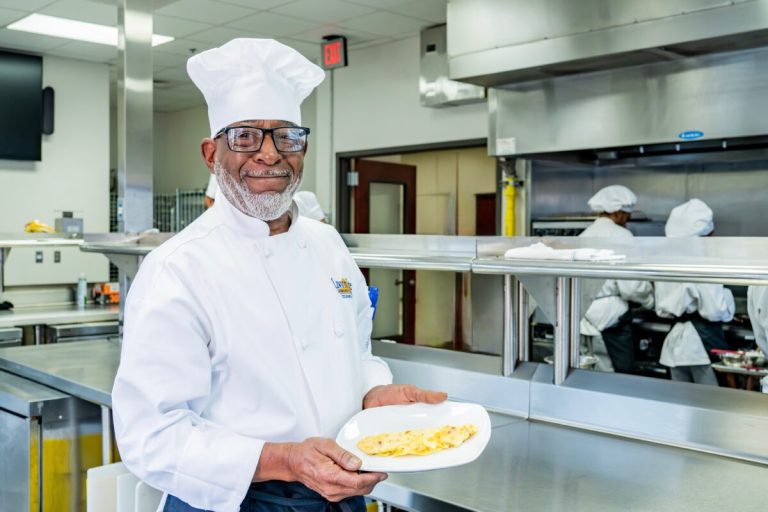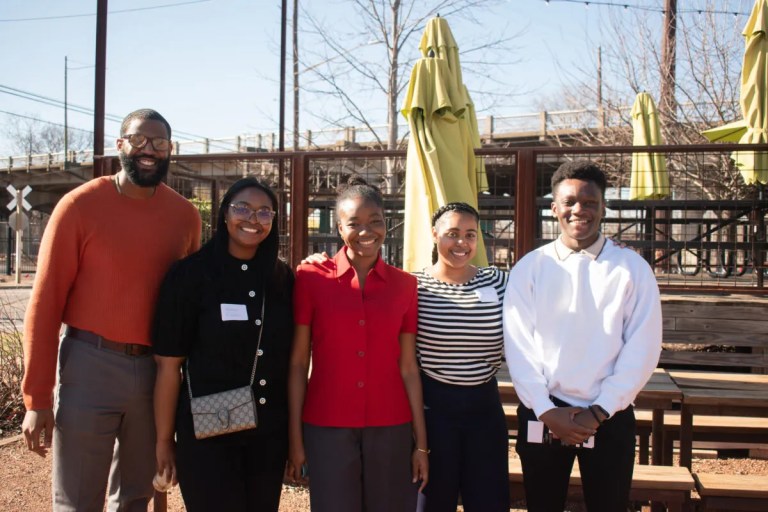Reviewed by: Michael Seale
Check out the most technologically-advanced chicken farm you’ve ever seen
Reading time: 5 minutes
Sponsored

“Poultry is not all old dusty barns,” according to Auburn professor Dr. Charlene Hanlon.
We got invited to tour Auburn’s Miller Center, and let us tell you—it’s not your average chicken farm.
Read on to learn about the impressive technology inside, Poultry Science graduates’ fantastic salaries and more.
Auburn’s Poultry Center—from farm to fork
Meet Dr. Charlene Hanlon

Originally from Canada, Dr. Hanlon never thought she’d call Auburn home. In fact, there were a lot of things she never saw herself doing—like becoming a Poultry Science professor.
“Originally, I was an Animal Biology undergraduate student, and I had been determined to be a vet since I was seven.
But during my undergrad, I started working in animal vet clinics, and I just got bored—I needed something more hands-on and exciting. So I accidentally joined a poultry club.”
Dr. Charlene Hanlon, Assistant Professor of Reproductive Physiology, Auburn
You’re probably wondering the same question we did: How does one accidentally join a poultry club? Here’s how Dr. Hanlon said it went down:
“I just wanted to go to dinner with my friend, but she wanted to stop by the poultry club first. So I went with her.
Soon, I learned that if I kept going to the club, I’d get an artificial insemination certificate, meaning I could actually learn how to breed chickens.
There was no hands-on experience in my undergraduate program. I decided to join the club and fell in love with it—it was the first time I got to work closely with animals.”
Dr. Charlene Hanlon, Assistant Professor of Reproductive Physiology, Auburn
The following summer, Dr. Hanlon began working in a chicken research lab and later got her PhD through the same lab. In 2022, she accepted a position with Auburn and moved down south.
“Poultry is not all old dusty barns” — common misconceptions


After touring the Miller Center, we quickly learned that Dr. Hanlon was right—poultry is a much more technologically advanced field than most of us could imagine.
Auburn’s Miller Center produces its own feed and carries eggs through the entire life cycle by automatically controlling temperatures, habitats and more.
Dr. Hanlon also addressed another common ‘chicken farm’ misconception—that poultry is a male-dominated industry.
“When most people meet me, they’re shocked—they don’t expect me to work in poultry.
But in Auburn’s College of Agriculture, 51% of poultry students are female. Over the years, I’ve had several men in the industry tell me that women are excellent in poultry. Because we’re generally better multitaskers, we can walk into a barn and quickly perceive what needs to be done.”
Dr. Charlene Hanlon, Assistant Professor of Reproductive Physiology, Auburn
Interactive hands-on learning

If you’re like Dr. Hanlon and want a career where you’re never bored, Poultry Science is the way to go. Many of the classes are taught on the farm at the Miller Center. Here’s an example of one of the of hands-on activities Dr. Hanlon does with her students:
- Students get to pick 30 eggs each. Over time, they hatch out the chicks and watch the embryonic development.
- During this process, they’ll do something called candling—putting lights over the eggs to view the embryo growing.
- If they notice the embryo is no longer living, they will crack open the shell to examine what happened.
Incredible job + networking opportunities

Earning a Poultry Science degree leads to more than working on a chicken farm. Here are a few examples of potential careers:
- Admin positions
- Human resources
- Management trainee positions (employee gets to train in every aspect of a company before deciding where they want to stay)
- Poultry marketing
- Supervisor roles
“I would say 75% of our students don’t end up working directly on the farm. Most of them take admin jobs and supervisor roles.
Of course, you do have the students who want to be on the farm. And they end up starting out on the farm and working up to the admin and supervisor roles.”
Dr. Charlene Hanlon, Assistant Professor of Reproductive Physiology, Auburn
Dr. Hanlon also provided some insight into the earning potential of Auburn’s Poultry Science graduates:
“The lowest offer I’ve heard one of our students get right out of college is in the 60’s. This is a multi billion dollar industry, and they’re not paying the people who are working in it poorly.”
Dr. Charlene Hanlon, Assistant Professor of Reproductive Physiology, Auburn
Auburn’s Poultry Science program also offers great networking opportunities, constantly bringing in industry professionals and alumni to make connections with students. According to Dr. Hanlon, it’s extremely rare for a Poultry Science student not to get multiple job offers upon graduation.
Check out Poultry Science at Auburn today

If you are interested in a hands-on career with incredible growth opportunities, check out Poultry Science at Auburn today.
Sponsored by:





